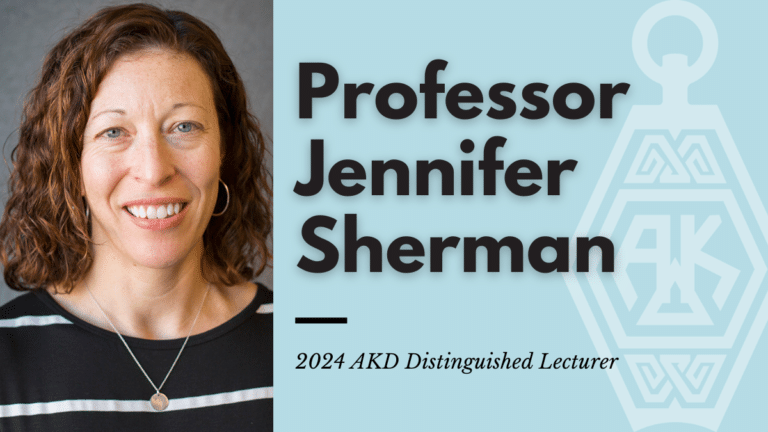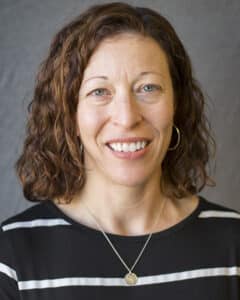
Each year, Alpha Kappa Delta (AKD) holds a Distinguished Lecture session at the annual meeting of the American Sociological Association (ASA). For the 2024 annual meeting, we have proudly chosen Dr. Jennifer Sherman, Professor of Sociology at Washington State University, as the AKD Distinguished Lecturer.
As we are prepare for her distinguished lecture, our Media Editor, Dr. Stephanie Wilson, reached out for a quick interview with Dr. Sherman. Keep reading to learn more about Sherman and her upcoming distinguished lecture to be held at the 2024 annual ASA meeting on Saturday, August 10th from 4:00pm-5:30pm at Palais des Congrès de Montréal, Level 5, 524A. We hope to see you there!
Meet Professor Jennifer Sherman

Dr. Sherman grew up in a small town in New England, where she was “deeply tied to the land and local environment, but also concerned about the lack of opportunities and ambivalent about the necessity to leave in order to achieve adult success.” In college, Sherman originally thought she wanted to study Environmental Studies, and wasn’t sure which major to choose when she transferred as a junior to the University of Wisconsin-Madison, which didn’t offer this major at the time. Regarding the choice, Jennifer told us:
I chose Rural Sociology because it seemed like it was the closest thing to my interests, and I realized as I looked at its course offerings that I was really much more interested in human interactions with environment than in environmental science. The undergraduate advisor I met with counseled me to switch my major to Sociology, which he argued looked better on a transcript and would open more career doors. I then switched to Sociology, but took many of my courses in the Rural Sociology Department, whose courses were all cross-listed. I discovered a real passion for the subject, and was lucky to find a mentor in Rural Sociology who offered me an RA job working with him on his projects related to rural poverty.
After graduation Jennifer wanted to keep working on rural poverty issues, and worked for three years as a research associate at a research institute called The California Institute for Rural Studies, in Davis, CA. But this experience made it clear to her how much more training she needed in order to do competent social research, which ultimately led her to pursue a PhD in Sociology at UC Berkeley. There, Sherman received invaluable mentorship in qualitative and ethnographic methods, which she combined with her undergraduate training in Rural Sociology to become the ethnographer of rural poverty and inequality that she is today.
Below we share an exclusive interview with Dr. Sherman regarding her upcoming lecture and her impressive sociological career thus far.
What can attendees can expect from your upcoming distinguished lecture at ASA?
I will be presenting on some of the main findings from my 2021 book, Dividing Paradise: Rural Inequality and the Diminishing American Dream. I will be discussing the concept of “class blindness,” a mechanism by which social class inequality is perpetuated without acknowledgement by those who benefit from class privilege. I present a case study from a gentrifying rural community, which illustrates the invisible social processes that can contribute to the reproduction of class inequality. Class blindness is a powerful device by which social inequality is accepted, reinforced, and reified by those who benefit from it, while also avoiding responsibility for taking action to address its causes.
What have been some of your most honorable accomplishments throughout your career as a sociologist?
My top accomplishments have probably been the publication of my two sole-authored books, Those Who Work, Those Who Don’t (2009), and Dividing Paradise (2021). I have been blessed with a number of honors throughout my career, including winning the Rural Sociological Society‘s Buttel book award twice, for the edited volume Rural Poverty in the United States in 2018, and for Dividing Paradise in 2023. Dividing Paradise also was a CHOICE Award recipient in 2022. I was also very proud to have been awarded my department’s graduate mentorship award twice, in 2014 and 2016.
In terms of engagement, I have been honored to serve two consecutive terms as a WSU Foley Fellow for the Humanities Washington Speakers Bureau, which has allowed me to present my work to popular audiences around the state of Washington. Humanities Washington has brought me to public libraries in large cities; libraries, theaters, and community centers in remote towns; all types of community organizations; and recently, several prisons. I have really cherished these opportunities to engage directly with local audiences. I have also been fortunate to work closely with numerous justice system stakeholders and social and health services providers across rural Eastern and Central Washington as part of my ongoing collaborative work on rural jail incarceration. I am grateful for these opportunities to truly make a difference in addressing some of the issues that our research uncovers.
Over my career I have been honored to serve in multiple elected positions to the Rural Sociological Society (RSS), Pacific Sociological Association (PSA), and Society for the Study of Social Problems (SSSP). But probably my proudest achievement was being elected to serve as president of the RSS for the 2023-2024 year. I have just stepped down from that position, and currently serve as Past President of the RSS. Being asked to give the AKD Distinguished Lecture at the ASA also features as one of my proudest career achievements.
Much of your sociological work has focused on rural communities in the United States. Can you share your insights as an expert on the reality of rural America today, including how policies and/or practices can support rural communities?
Rural communities face so many challenges, including lack of tax bases and economies of scale to provide the same services that urban communities can provide. This means that they frequently lack access to health care, social services, transportation, and of course basics like housing and jobs. And at the same time there is little understanding of their challenges and their cultural norms, and rural communities and populations are often overlooked, ignored, and disdained by policymakers, pundits, and even academics.
There is a need for so much more attention to rural populations and rural concerns, and recognition that rural residents are not in this position because they have made bad choices or have voted against their own interests, but rather because rural areas have long been treated as sources of resource extraction that are expendable once those resources have been exhausted or cheaper sources discovered elsewhere. Rural places need more attention at all levels, and more that is empathetic and that respects these people and places, and understands the value of place-based culture, cohesive communities, and close relationships to land. I would love to see states make more of an effort to ensure that their policies recognize the need to support rural counties and support healthy, thriving communities. And I would love to see more mainstream sociologists pay attention to rural America, and to see it as integral to understanding the larger nation.
If you had to choose one major finding from your years of research that you wish more people—sociologists and otherwise—understood, what would that be?
As a sociologist I see the concept of moral capital as my biggest contribution to the field. This is a form of tradeable symbolic capital in the Bourdieusian sense, which comes into play in small, homogeneous communities like the ones I study. In places like these, where there are few other sources of distinction, boundaries based on moral understanding of things like work ethics and family values can rise in significance to be a form of capital upon which much social life depends. It is my hope to see more sociologists engage with this concept and uncover its nuances in other communities and contexts, including questions like how it interacts with other axes of inequality. Beyond this, I hope that more people understand the strengths of rural people and their importance to modern US society.
Lastly, broadly, what does being a sociologist mean to you?
Being a sociologist to me is about understanding social life and social patterns in ways that are complex and inclusive of so many different structural, cultural, and individual processes. I see Sociology as one of the broadest of the social sciences, in that we take on all of these different perspectives and levels of analysis. I see our role as being able to make sense of some of the most complicated and important issues of our times, including some of the most concerning social problems. But only in understanding big problems can we hope to create holistic and realistic solutions. For this reason, I see sociologists as invaluable and I am proud to be one of them.
Thank you, Dr. Sherman, for sharing your insightful answers and for being our 2024 Distinguished Lecturer!
Please join us for what will surely be an engaging lecture from Dr. Sherman on Saturday, August 10th at 4pm at Palais des Congrès de Montréal, Level 5, 524A.